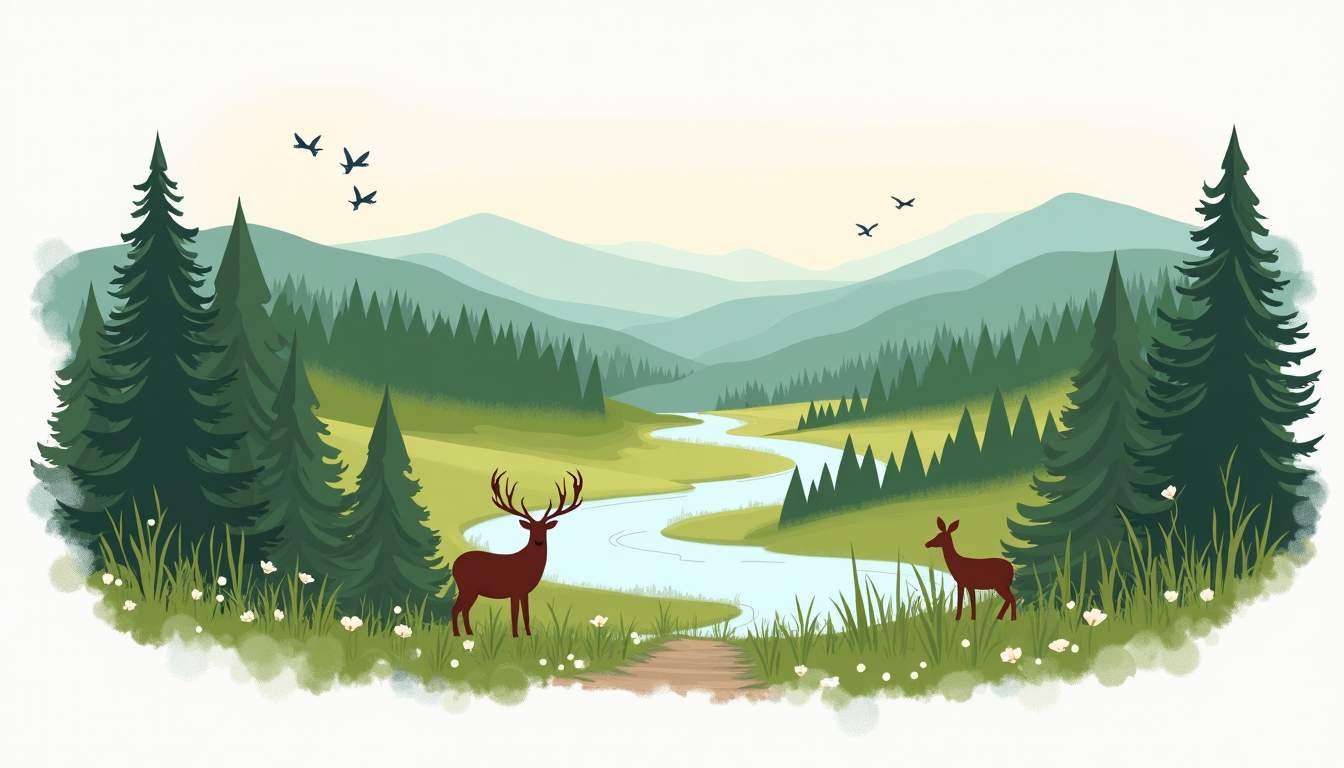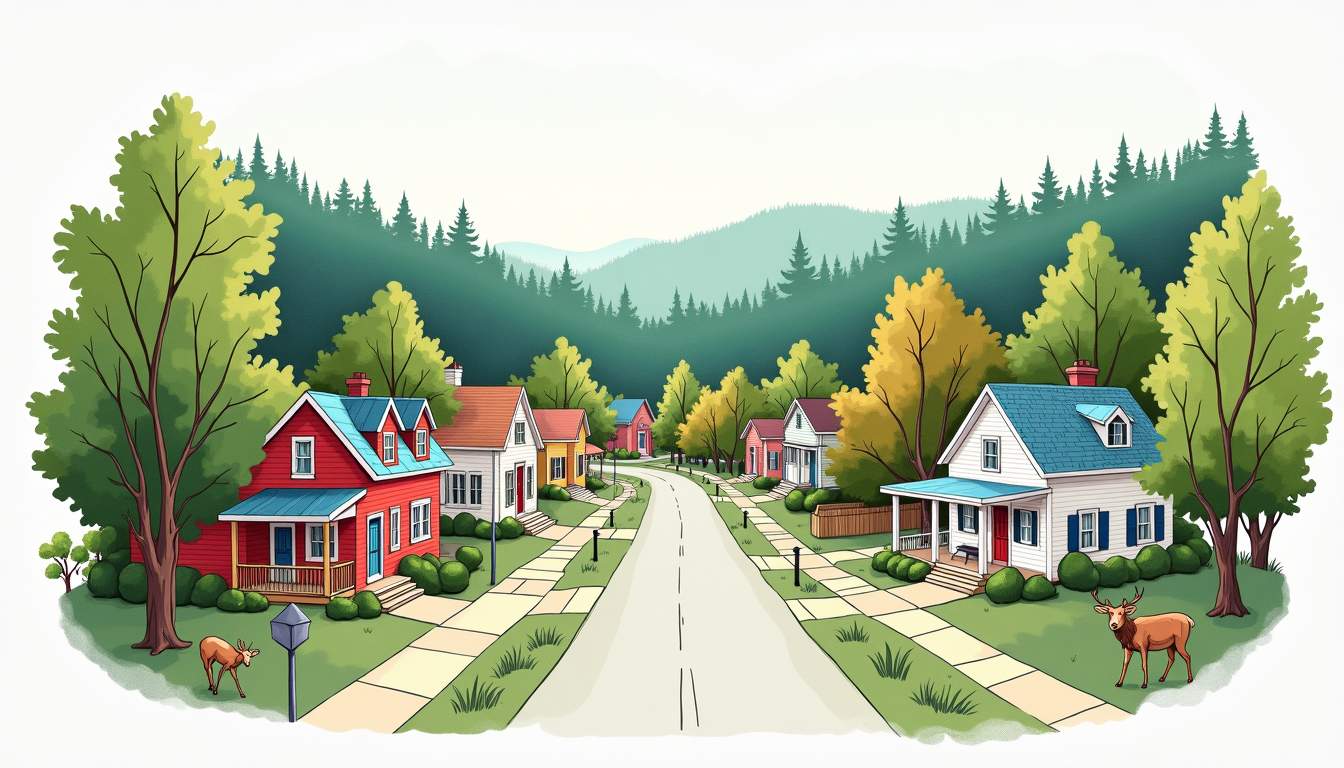
East Tennessee is a place where ridgelines meet river valleys, and small towns thrive on outdoor recreation, conservation efforts, and deep-rooted local culture. This guide is designed to help residents and visitors find nature-focused communities, outdoor resources, volunteer opportunities, and practical tips for living lightly in this unique region. Whether drawn to family-friendly trails, bird-rich wetlands, or community gardens in quaint downtowns, this guide highlights places and practices that make East Tennessee an inviting destination for nature-minded people.
The region's geography sets the stage: rolling Appalachian foothills, the Blue Ridge and Cumberland Mountains, and a dense network of rivers and streams create abundant habitats and scenic vistas. These landscapes support diverse plant and animal life and offer endless opportunities for outdoor activities like hiking, paddling, and wildlife watching.
Beyond natural beauty, the region's towns are often anchored by a culture of stewardship. Local governments, land trusts, and civic groups frequently collaborate to protect open space and create parks, trails, and greenways. This mix of accessible wild spaces and active community engagement makes East Tennessee especially appealing to people who want to combine a nature-centered lifestyle with civic participation.
Gatlinburg acts as a gateway to Great Smoky Mountains National Park and is ideal for those who want immediate access to wilderness. Trails, mountain vistas, and roadside overlooks are steps away from many neighborhoods. Local outdoor groups organize regular trail maintenance and educational hikes, making it easy for newcomers to connect with conservation efforts.

The town blends tourist infrastructure with resident-focused amenities. While peak seasons bring crowds, nearby residential pockets offer quieter living with the same access to backcountry resources and outdoor programming.
Knoxville provides a balance of metropolitan services and nearby green space. Urban trails, neighborhood parks, and the Tennessee River Greenway make it simple to incorporate nature into daily life. Community gardens, native plant initiatives, and neighborhood-led creek cleanups are common and well-supported.
For families and professionals, Knoxville has schools and services while still offering quick drives to larger wilderness areas. Local nonprofits focused on watershed health and biodiversity create volunteer opportunities that help residents become active stewards of local ecosystems.
Chattanooga is recognized for its outdoor recreation amenities and mountain biking networks. Riverfront parks, access to the Tennessee River, and proximity to Lookout Mountain create a city where outdoor sports and environmental causes thrive. Entrepreneurs and small businesses focused on outdoor gear and guided experiences have formed a supportive local economy around active lifestyles.
Neighborhoods near trails and parks are especially attractive to people who prioritize a daily connection to nature, and community events often center on outdoor education and conservation themes.
Smaller towns—those bordering wildlife management areas, state parks, and national forest land—offer a quieter pace and deeper immersion in natural settings. These communities often have low-density development, strong volunteer networks for habitat restoration, and neighbors who share knowledge about local wildlife and seasons.
Land trusts play a major role in East Tennessee, securing easements and managing preserves that protect habitat corridors and scenic views. These organizations frequently host volunteer stewardship days, citizen science projects, and educational workshops on land management and native plant restoration.
Trail associations maintain miles of hiking paths, mountain bike singletrack, and equestrian routes. These volunteer-run groups provide trail maps, organize build days, and offer training sessions on sustainable trail use. Joining a local chapter is one of the fastest ways to meet like-minded neighbors and contribute directly to outdoor access.
Nature centers in the region provide year-round programming: guided walks, wildlife talks, summer camps for kids, and adult classes on topics like bird identification, native gardening, and stream ecology. These centers often work with schools and municipalities to promote outdoor classrooms and habitat-friendly landscaping.
Adopting native plants, reducing lawn acreage, and creating pollinator-friendly gardens help sustain local biodiversity and reduce maintenance needs. Many communities offer native plant sales and workshops to help residents transition landscapes in ways that support local wildlife and conserve water.
Rain barrels, permeable driveways, and rain gardens are practical stormwater solutions that protect streams from runoff. Homeowners can often find rebates or guidance from local utility programs or watershed groups to implement these measures affordably.
Energy efficiency measures—insulation, heat pumps, and LED lighting—lower household carbon footprints and save money. Community solar projects and local incentives sometimes make clean energy more accessible in areas where individual rooftop solar is impractical.
Composting programs, repair cafes, and tool libraries reduce waste and build community resilience. These initiatives are often operated by neighborhood associations or nonprofit organizations, and they provide low-cost options for reducing household waste streams.
From easy nature loops to demanding ridge hikes, the region offers trails for all abilities. Well-marked trailheads in state parks and national forest lands support day trips and overnight backpacking. Scenic byways and forest service roads provide access to overlooks, waterfalls, and quiet picnic spots.
Paddling, fishing, and birdwatching are popular along the region's rivers, lakes, and reservoirs. Kayak and canoe put-ins are plentiful along the Tennessee River and its tributaries, and shallow wetlands attract migratory waterfowl and songbirds. Local outfitters and paddling groups often run safety clinics and guided trips for newcomers.
Winter offers different rhythms—quiet trails, clear skies for stargazing, and chances to see seasonal wildlife behaviors. Off-season volunteer work, like invasive species removal and winter tree pruning in community orchards, helps maintain ecological health when trails are less crowded.
Farmers markets, native plant sales, and seasonal nature festivals combine culture with conservation. These events highlight local artisans, ecological education booths, and opportunities to meet group leaders for hikes, stewardship projects, and citizen science initiatives.

Programs that track bird populations, water quality, and seasonal phenology depend heavily on volunteers. Citizen scientists contribute valuable data while learning more about local ecosystems. Training is often provided, and participation helps communities make informed conservation decisions.
Volunteer workdays—trail building, river cleanups, and habitat restoration—are welcoming entry points into community conservation. Most groups supply tools, instruction, and camaraderie, and these projects are suitable for families, students, and groups looking to give back.
When looking for a nature-focused community, consider proximity to protected lands, availability of trails and greenways, and the presence of active conservation organizations. Access to schools, healthcare, and local services should also factor into decisions, especially for families and older adults.

Neighborhood culture matters: some places emphasize rugged outdoor sports, while others focus on birding, gardening, or educational programming. Visiting during different seasons and attending a community event can reveal what daily life feels like beyond polished brochures.
Rural properties offer privacy and closer contact with nature but require attention to maintaining septic systems, wildfire defensibility, and streamside protections. Urban and suburban neighborhoods provide community infrastructure and managers who oversee shared green spaces. Zoning, covenants, and local ordinances can shape what activities are allowed on properties, so reviewing local rules is essential.
Join local social media groups, sign up for newsletters from land trusts and parks departments, and visit community centers to learn about upcoming events. Volunteer days are an efficient way to meet neighbors and discover opportunities that match personal interests and skills.
East Tennessee experiences distinct seasons; prepping for summer heat and winter cold is crucial. Learn basic backcountry safety: carry water, a map or GPS, weather-appropriate clothing, and a first-aid kit. Familiarity with local wildlife—such as black bears, venomous snakes, and ticks—helps reduce risks and supports coexistence.
Many small towns in East Tennessee have transformed single projects into lasting cultural shifts: a river cleanup that grew into a watershed alliance, a schoolyard garden that inspired neighborhood food-sharing programs, or a single trail that became the spine of a town's recreational economy. These examples demonstrate how focused effort and collaboration can yield measurable ecological and social benefits.
Local success stories often began with a few committed residents and a clear, manageable goal. Over time, those efforts attracted volunteers, grant funding, and municipal support. The result is a network of green spaces, educational programs, and economic opportunities rooted in stewardship.
Research towns and neighborhoods with the specific outdoor amenities that match personal interests—whether that means daily river access, proximity to mountain trails, or a community garden within walking distance. Reach out to local nonprofits and municipal parks departments to learn about volunteer opportunities and upcoming events. Take time to visit in different seasons and attend community meetings or festivals to get a realistic sense of life in each place.
Finding the right community in East Tennessee often involves balancing access to wild places with practical needs like jobs, schools, and healthcare. With careful research and an open attitude toward participation in local efforts, a nature-focused lifestyle is achievable and deeply rewarding in this region.
Local land trusts, municipal parks departments, and state and federal agencies offer maps, volunteer calendars, and guidance for newcomers. Nature centers and outdoor retailers often maintain bulletin boards with event listings and volunteer needs. Libraries and community colleges frequently host classes on native plant gardening, wildlife identification, and outdoor skills that are useful for anyone committed to living thoughtfully in East Tennessee.
Engaging with these resources supports both individual well-being and the long-term resilience of the region's ecosystems. The combination of accessible wild spaces and active community stewardship makes East Tennessee an especially promising place for those who want to live close to nature while contributing to shared conservation goals.
For those inspired by East Tennessee’s natural beauty and community spirit, Tennessee National offers an exceptional opportunity to live immersed in nature without sacrificing luxury. Join a premier gated community featuring scenic trails, a Greg Norman Signature Golf Course, a private marina, and vibrant social clubs—all within striking distance of East Tennessee’s outdoor treasures. Whether you seek a move-in ready home or a custom build, experience resort-style living designed to complement your passion for the outdoors. Schedule a Private Tour today and begin your journey to making lasting memories surrounded by nature’s best.